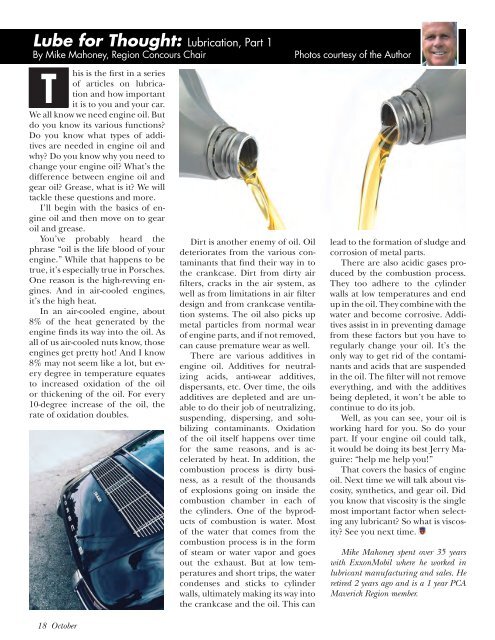Slipstream - October 2017
The monthly newsletter of the Maverick Region of the Porsche Club of America
The monthly newsletter of the Maverick Region of the Porsche Club of America
You also want an ePaper? Increase the reach of your titles
YUMPU automatically turns print PDFs into web optimized ePapers that Google loves.
Lube for Thought: Lubrication, Part 1<br />
By Mike Mahoney, Region Concours Chair<br />
Photos courtesy of the Author<br />
his is the first in a series<br />
T<br />
of articles on lubrication<br />
and how important<br />
it is to you and your car.<br />
We all know we need engine oil. But<br />
do you know its various functions?<br />
Do you know what types of additives<br />
are needed in engine oil and<br />
why? Do you know why you need to<br />
change your engine oil? What’s the<br />
difference between engine oil and<br />
gear oil? Grease, what is it? We will<br />
tackle these questions and more.<br />
I’ll begin with the basics of engine<br />
oil and then move on to gear<br />
oil and grease.<br />
You’ve probably heard the<br />
phrase “oil is the life blood of your<br />
engine.” While that happens to be<br />
true, it’s especially true in Porsches.<br />
One reason is the high-revving engines.<br />
And in air-cooled engines,<br />
it’s the high heat.<br />
In an air-cooled engine, about<br />
8% of the heat generated by the<br />
engine finds its way into the oil. As<br />
all of us air-cooled nuts know, those<br />
engines get pretty hot! And I know<br />
8% may not seem like a lot, but every<br />
degree in temperature equates<br />
to increased oxidation of the oil<br />
or thickening of the oil. For every<br />
10-degree increase of the oil, the<br />
rate of oxidation doubles.<br />
18 <strong>October</strong><br />
Dirt is another enemy of oil. Oil<br />
deteriorates from the various contaminants<br />
that find their way in to<br />
the crankcase. Dirt from dirty air<br />
filters, cracks in the air system, as<br />
well as from limitations in air filter<br />
design and from crankcase ventilation<br />
systems. The oil also picks up<br />
metal particles from normal wear<br />
of engine parts, and if not removed,<br />
can cause premature wear as well.<br />
There are various additives in<br />
engine oil. Additives for neutralizing<br />
acids, anti-wear additives,<br />
dispersants, etc. Over time, the oils<br />
additives are depleted and are unable<br />
to do their job of neutralizing,<br />
suspending, dispersing, and solubilizing<br />
contaminants. Oxidation<br />
of the oil itself happens over time<br />
for the same reasons, and is accelerated<br />
by heat. In addition, the<br />
combustion process is dirty business,<br />
as a result of the thousands<br />
of explosions going on inside the<br />
combustion chamber in each of<br />
the cylinders. One of the byproducts<br />
of combustion is water. Most<br />
of the water that comes from the<br />
combustion process is in the form<br />
of steam or water vapor and goes<br />
out the exhaust. But at low temperatures<br />
and short trips, the water<br />
condenses and sticks to cylinder<br />
walls, ultimately making its way into<br />
the crankcase and the oil. This can<br />
lead to the formation of sludge and<br />
corrosion of metal parts.<br />
There are also acidic gases produced<br />
by the combustion process.<br />
They too adhere to the cylinder<br />
walls at low temperatures and end<br />
up in the oil. They combine with the<br />
water and become corrosive. Additives<br />
assist in in preventing damage<br />
from these factors but you have to<br />
regularly change your oil. It’s the<br />
only way to get rid of the contaminants<br />
and acids that are suspended<br />
in the oil. The filter will not remove<br />
everything, and with the additives<br />
being depleted, it won’t be able to<br />
continue to do its job.<br />
Well, as you can see, your oil is<br />
working hard for you. So do your<br />
part. If your engine oil could talk,<br />
it would be doing its best Jerry Maguire:<br />
“help me help you!”<br />
That covers the basics of engine<br />
oil. Next time we will talk about viscosity,<br />
synthetics, and gear oil. Did<br />
you know that viscosity is the single<br />
most important factor when selecting<br />
any lubricant? So what is viscosity?<br />
See you next time.<br />
Mike Mahoney spent over 35 years<br />
with ExxonMobil where he worked in<br />
lubricant manufacturing and sales. He<br />
retired 2 years ago and is a 1 year PCA<br />
Maverick Region member.


















